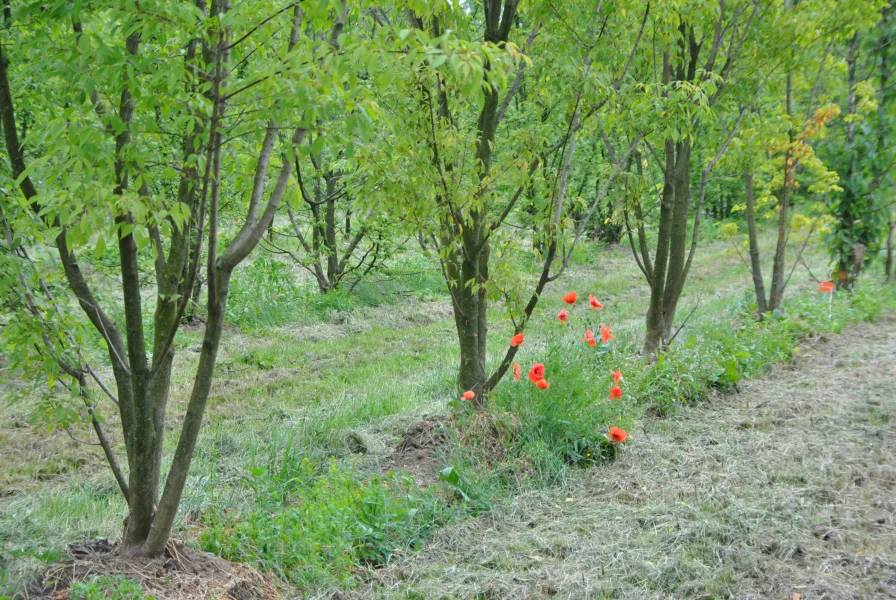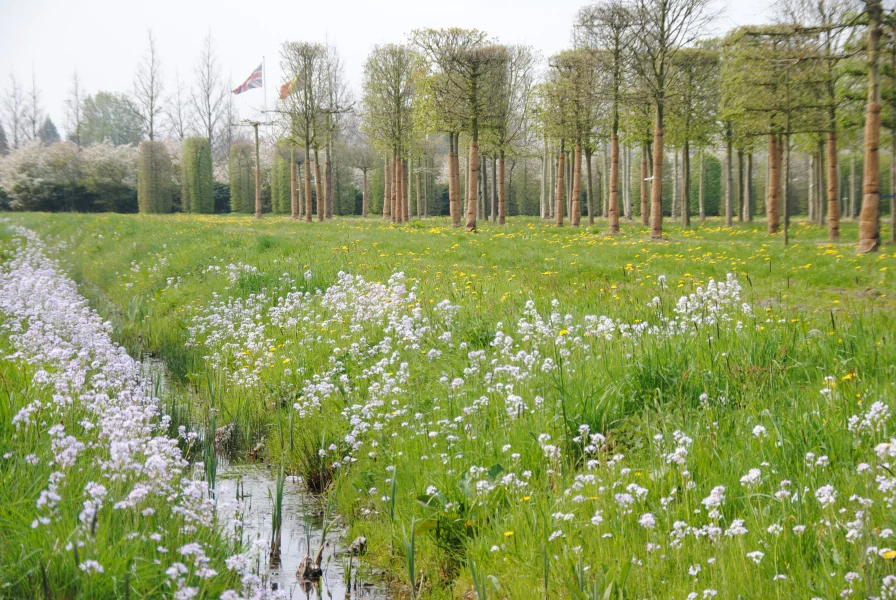Nest boxes and flower mixes
We help natural enemies. For example, nesting boxes for birds are scattered around the nursery. They eat caterpillars, preventing damage to the trees. We also encourage beneficial insects by sowing flower mixtures. This can be done between the rows of trees, instead of on grass strips. For example, if a plot has been cleared and is lying fallow, we sow one quarter with a flower mixture and three quarters with Japanese oats. The flowers attract a lot of natural enemies; there is a buzz when you walk there.
In our nursery we are fortunate not to have leatherjackets or grubs. These are more common on lighter sandy soils, while we grow on heavier ones. But even if these larvae were present, natural enemies such as birds and bats can help to control them.
So nature is able to keep many diseases and pests under control, but there are a few exceptions that we keep a close eye on in the nursery: powdery mildew in species such as Amelanchier lamarckii, oak processionary caterpillar in Quercus robur and possibly botrytis, pestalotia and phomopsis in Sequoiadendron giganteum (cause of branch dieback *https://edepot.wur.nl/294236). All these species continue to please our customers.
When choosing a species, we also take into account its susceptibility to a particular disease or pest. If it is difficult for us or nature to control, we decide to remove the species from our range. For example, we almost never grow Fraxinus excelsior because of its susceptibility to the ash dieback disease, but we do grow Fraxinus pennsylvanica or other ashes that are not susceptible to the fungus.
Less pressure from the oak processionary caterpillar
Disease and pest pressure varies seasonally due to nature and the weather. For example, the pressure of the oak processionary caterpillar is much lower now than it was a few years ago. But this is also because the municipalities are more involved in the management of the caterpillar. From a public health point of view, they are treating the oaks in public parks with biological products as a preventive measure. We are happy with this because it has a positive effect on the nursery and disease pressure. Quercus robur is by far the most susceptible to the oak processionary caterpillar; other species and cultivars are less susceptible.
Resistance to a disease or pest is an important concern for us. We are constantly looking to improve the range. For example, we are now breeding clones of Sequoiadendron giganteum that are not susceptible to branch dieback. Or our new Aesculus hippocastanum TREEVOLUTION ‘Cyrilles Clean’ PBR, which is not susceptible to the chestnut leafminer.
In addition, our nursery team remains vigilant for incipient infestations. Some carry a magnifying glass to better identify and report any disease, pest or infestation. We then decide what crop protection is needed. We also ask ourselves how bad the infestation is: is it acceptable? The most important thing is that the quality of the tree remains high.
Greatly reduced herbicide use thanks to mirror sprayer
Finally, we use very little herbicide to control weeds. In fact, we have been sowing grass between the rows for a long time and can now do the same between the trees. The only weeds left are at tree level. We now use what we call a mirror sprayer: equipment that works on a sensor, sees the tree and sprays only the mirror, not the whole row. This further reduces the use of pesticides.
Organic trees
In addition to our sustainable and environmentally friendly growing methods, we are also proud of our range of organic trees, which are part of our 2020 range. Grown without the use of chemical pesticides and artificial fertilisers, these Skal-certified trees fit perfectly with our philosophy of promoting natural crop protection and minimising our impact on the environment.
The quality of our organic trees is excellent and no less than the regular trees grown in our nursery. This is partly due to the knowledge we have gained over the last 15 years with alternative growing methods and the reduction of pesticides in our regular growing. Although the process of growing organic trees is more labour intensive and therefore more expensive, the results are promising and our range of organic trees is expected to grow in the coming years.
Skal biocontrol ensures that our organic trees comply with the applicable Dutch and European regulations and guarantees that our organic trees are grown in a responsible and sustainable manner. By choosing organic trees from Van den Berk Nurseries, you are contributing to a healthier and more resilient green environment that is in harmony with nature.
 English
English
 English (United Kingdom)
English (United Kingdom)
 Nederlands
Nederlands
 Nederlands (België)
Nederlands (België)
 Deutsch
Deutsch
 français
français
 čeština
čeština
 polski
polski
 español
español
 română
română
 dansk
dansk
 svenska
svenska
 magyar
magyar
 Türkçe
Türkçe
 slovenčina
slovenčina
 русский
русский
 norsk
norsk








